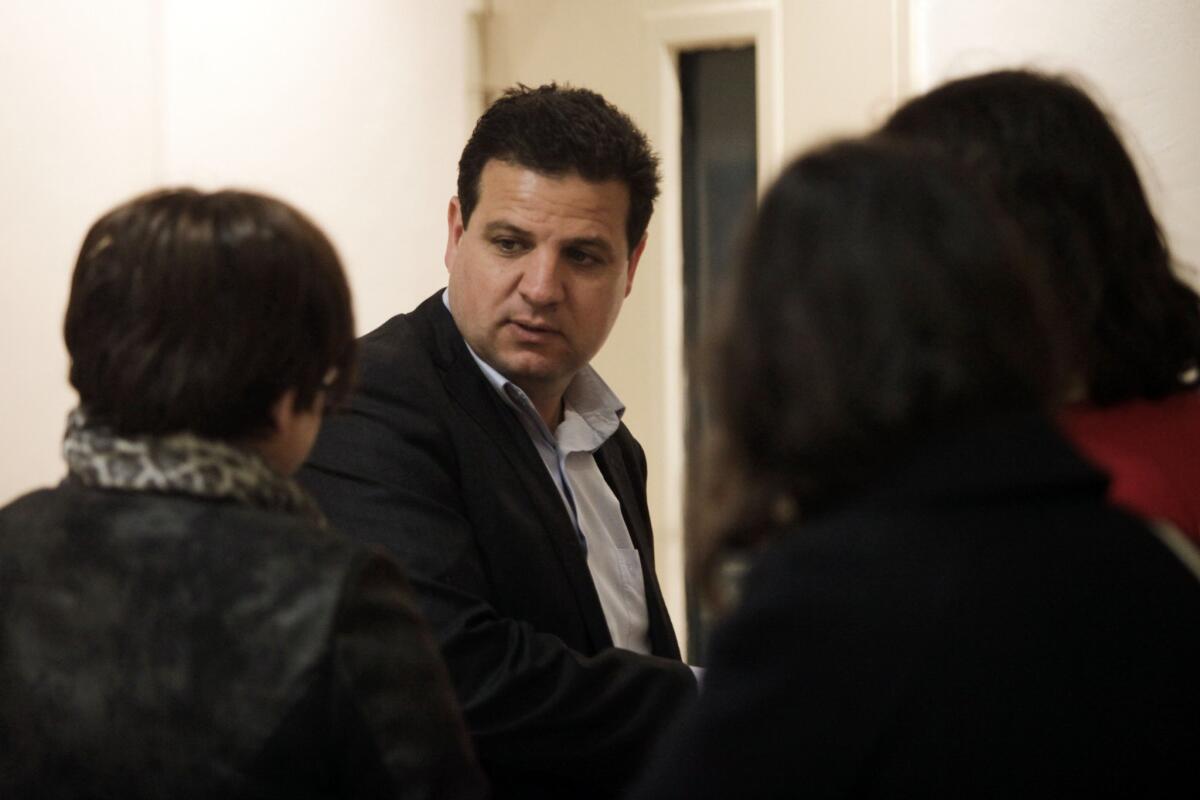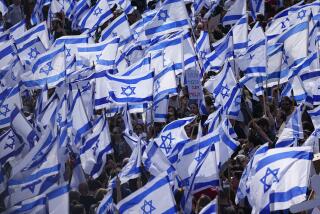Israel’s election: Arab parties have high hopes with united front

- Share via
Reporting from Kfar Manda, Israel — Ayman Odeh was running late, as usual. But like the charismatic politician he is, Odeh lingered over handshakes and looked constituents meaningfully in the eye, sometimes placing his hand atop his own tousled head while he listened carefully to their questions.
Among his fellow Arab citizens of Israel, Odeh has long been a known quantity, a lawyer from Haifa who began his political career nearly two decades ago when he was elected to the city council at just 23.
But now, as the leader of a four-party Arab alliance forged in order to compete in Israel’s elections next week, the 40-year-old Odeh is suddenly on everyone’s electoral radar – Jews and Arabs alike.
Polls suggest his alliance, the Joint List, will garner in the neighborhood of 15 seats in the 120-seat Knesset, or parliament. That would make it the third-largest Israeli political party, and a serious force to be reckoned with in wrangling over a ruling coalition that is expected to follow the vote.
Odeh’s rise marks a dramatic change of tactics for Israel’s Arab political parties, which have traditionally been tiny and splintered. Arabs make up one-fifth of the population but have long felt disconnected from Israeli politics – until now.
“When we were split into several small parties, no one paid us much attention, but this time around, it will be a different story altogether,” Odeh said. In an ebullient Facebook post, he expressed the belief that the Arab bloc was “on our way to the biggest parliamentary achievement in 60 years.”
The last year has been a trying one for Israel’s Arab citizens, who have long considered themselves a downtrodden minority. Many were disturbed by the summer’s bloody conflict in the Gaza Strip but feared a backlash from Jewish Israelis if they made their views known. Israeli Prime Minister Benjamin Netanyahu also had pushed hard for a measure emphasizing Israel’s Jewish character – at the expense, critics said, of its democratic one, and in language that made Arab Israelis feel further marginalized.
In a bit of political irony savored by Odeh’s allies, the impetus for forming a joint campaign list came from Israel’s right-wing foreign minister, Avigdor Lieberman, whose party pushed a law through the last Knesset that raised the threshold of votes a party must achieve to be represented. The move was widely viewed as a bid to push Arab politicians out of the parliament altogether.
Lieberman also gave Odeh an inadvertent boost by haranguing him in a nationally televised debate, accusing his bloc of representing terrorism. Odeh kept his cool, kept smiling and stayed on message – that the alliance wants to look out for the rights of all disadvantaged Israelis, not only the Arab minority.
At stump stops in a jam-packed campaign schedule, Odeh preaches the politics of inclusion, even when some in his audience express skepticism. At meetings in places such as Kfar Manda, a lower Galilee village of 15,000 residents known to its mainly Arab inhabitants as Kufr Manda, he insists that the Arab parties can overcome wide ideological differences and work for the common good.
Odeh got good marks for connecting with his audience, made up mainly of members of the village’s biggest clan, the Zeidan family. Sweets and fruit were passed around while elders listened and nodded from the plastic chairs that lined the walls.
“We knew Ayman Odeh very well, even before he became a candidate,” said Salim Zeidan. “We always thought of him as representing the new and young generation and leadership. He is the kind of person who always wants to work for his people.”
Despite what appears to be an election juggernaut, there are some audible creaks in the alliance’s machinery, with tensions both within the bloc as well as with some traditional Israeli parties such as the left-leaning Meretz, with which it has a partially overlapping voter base.
Meretz was furious when Odeh was unable to secure his alliance’s support for an agreement that would have, under a quirk of the Israeli electoral system, keep loose votes from being “lost” and help the left wing’s showing. Odeh also has been quoted in some reports as warning Arab voters that supporting any party other than the Arab bloc amounted to a “contaminated” ballot.
In addition, even a successful showing would pose a quandary for the alliance. Odeh has not expressed any willingness to join a coalition with the Zionist Union, the center-left bloc that appeared in the latest polls to be pulling ahead of Netanyahu’s conservative Likud. But he has not completely closed the door.
The parties within the Arab alliance have deep differences of political philosophy, ranging as they do from former Communists to national-secularists to Islamists. Some observers predict that the bloc will lapse into infighting after the election.
Odeh, who speaks fluent Hebrew with a barely discernible accent, has not confined his campaign appearances to the country’s Arab heartland. After a panel discussion at Hebrew University in Jerusalem, Odeh said he was heartened when some Jewish audience members wanted afterward to shake his hand and pose with him for selfies.
“If I speak as an Arab only, I will be treated as an Arab only,” he said. “If I speak as an Arab, a citizen and a democrat, I will be regarded as such.”
Times staff writer King reported from Kfar Manda and special correspondent Sobelman from Jerusalem. Special correspondent Maher Abukhater in Ramallah, West Bank, contributed to this report.
Follow @laurakingLAT on Twitter for news out of the Middle East
More to Read
Sign up for Essential California
The most important California stories and recommendations in your inbox every morning.
You may occasionally receive promotional content from the Los Angeles Times.











